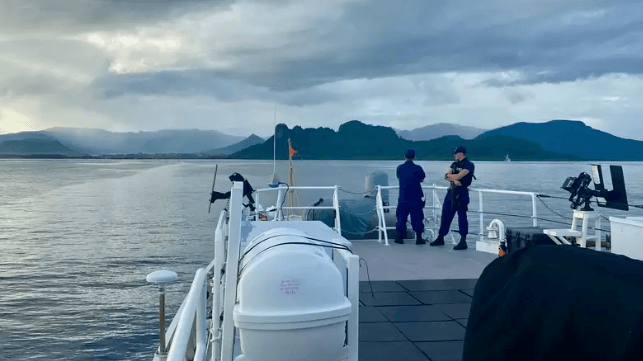Report: U.S. Coast Guard Works to Expand Ties With Pacific Island Nations

As part of the tri-maritime service strategy, the U.S. Coast Guard has increased its presence in the Pacific islands in a bid to offset growing Chinese influence. A key enabler for this mission is a set of law-enforcement partnerships with island nations. Under ship-rider agreements, cutter crews can take aboard a local law enforcement officer and pursue suspected illegal fishing activity within the partner state's EEZ. This is an opportunity for building valuable relationships and establishing a presence in far-flung territories, complete with port access for refueling and replenishment. Small, capable Fast Response Cutters (FRCs) based out of Guam have augmented this mission at high volume and low cost, while the far larger West Coast-based National Security Cutters make occasional long-range, long-endurance passes through the region.
To date, the Coast Guard has signed shiprider agreements with 12 Pacific island nations, many of which are longtime U.S. allies (or former territories). The agency is working hard to expand that list, according to a new report from Reuters. Papua New Guinea is the latest addition and signed a shiprider agreement in May. The U.S. Navy has occasionally assisted these fisheries enforcement partnerships by supplying vessels suitable for fishery patrols, like the littoral combat ship USS Mobile (with a Coast Guard Law Enforcement Detachment boarding team handling inspections).
Holdouts include the Solomon Islands, which has grown closer to China in recent years. Vanuatu's government has also strengthened ties with China, and recently denied a Coast Guard cutter timely access to port for refueling. (The Coast Guard notes that it does have a formal shiprider agreement with Vanuatu.)
The Federated States of Micronesia (FSM), a former U.S. trust territory with a continuing compact of association with the U.S., has gone a step further than shiprider agreements. It has granted the U.S. Coast Guard the authority to conduct boardings on its behalf, bringing federal law enforcement back to its waters for the first time since its independence from the U.S. in 1986. (The Coast Guard emphasizes that its officers will be enforcing FSM's laws, not U.S. federal laws.)
The arrangement with the Coast Guard aligns with FSM's close ties to the other U.S. armed forces. FSM citizens can easily join the U.S. military, and hundreds are recruited every year. In return, under the compact of free association, the U.S. military is solely responsible for FSM's defense.
Talks are in progress with other Pacific island nations to add boarding authorization for the Coast Guard without a local shiprider on board, according to Reuters. (The Coast Guard prefers the term "expedited boarding provision.") This form of agreement allows U.S. Coast Guard cutter crews to pursue enforcement opportunities without first diverting to pick up a local government official, speeding up the process and enabling a higher rate of activity.

that matters most
Get the latest maritime news delivered to your inbox daily.
“A lot of Pacific Island nations are interested in that and so are we. The logistics of picking up a ship rider is complicated,” U.S. Coast Guard Captain Angela Cook told Reuters.
As it expands service-to-service relationships with law enforcement agencies in the Pacific, the Coast Guard is looking to gear up for more patrols. In its unfunded priorities list for Congress for FY2024, the Coast Guard included a line item for $400 million to fund the acquisition of four more Fast Response Cutters (FRCs), the smallest and most numerous of its seagoing vessels. The FRC has proven itself on long-distance patrols out of Hawaii and Guam, performing tasks above and beyond what might be expected of a 150-foot patrol boat.
